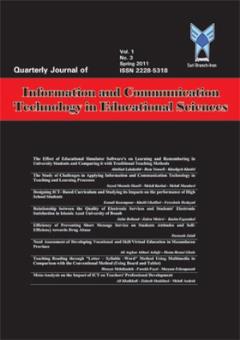Subject Areas :
jafar faridisfanjany
1
![]() ,
صادق رضایی
2
,
ابوطالب سعادتی شامیر
3
,
صادق رضایی
2
,
ابوطالب سعادتی شامیر
3
1 -
2 -
3 -
Keywords:
Abstract :
References
Ang, W. H. D., Shorey, S., Lopez, V., Chew, H. S. J., & Lau, Y. (2021). Generation Z undergraduate students’ resilience during the COVID-19 pandemic: a qualitative study. Current Psychology, 1-15.
Antonopoulou, H., Halkiopoulos, C., Barlou, O., & Beligiannis, G. N. (2021). Transformational leadership and digital skills in higher education institutes: during the COVID-19 pandemic. Emerging science journal, 5(1), 1-15.
Arnett, J. (2000). A Theory of Development Erikson, EH (1989). Identitas dan Siklus, 469-480.
Bailey, K. A. (2020). Indigenous students: Resilient and empowered in the midst of racism and lateral violence. Ethnic and Racial Studies, 43(6), 1032-1051.
Charles, N. E., Strong, S. J., Burns, L. C., Bullerjahn, M. R., & Serafine, K. M. (2021). Increased mood disorder symptoms, perceived stress, and alcohol use among college students during the COVID-19 pandemic. Psychiatry research, 296, 113706.
Dan Schawbel. (2014). Gen Z Employees: The 5 Attributes You Need to Know. Retrieved from http://www.entrepreneur.com/article/236560...
Fernandes, S., Mahendiran, S., & Balasudarsun, N. L. (2023). Teachers' assessment of the challenges faced during COVID-19 outbreak and new-normal teaching: qualitative study. Journal of Applied Research in Higher Education.
Flores, M. A. (2020). Preparing teachers to teach in complex settings: Opportunities for professional learning and development. European Journal of Teacher Education, 43(3), 297–300.
Hadar, L. L., et al. (2020). "Rethinking teacher education in a VUCA world: student teachers’ social-emotional competencies during the Covid-19 crisis." European journal of teacher education 43(4): 573-586.
Hajizadeh, A., Azizi, G., & Keyhan, G. (2021). Analyzing the opportunities and challenges of e-learning in the Corona era: An approach to the development of e-learning in the post-Corona. Research in Teaching, 9(1), 204-174.
Hennink, M. M., Kaiser, B. N., & Marconi, V. C. (2016). Code Saturation Versus Meaning Saturation: How Many Interviews Are Enough? Qualitative Health Research, 27(4), 591-608. doi:10.1177/1049732316665344
Hildebrandt, M. (2021). "Creativity and Resilience in Art Students During COVID-19." Art Education 74(1): 17-18.
Kadir, A. A. (2020). "Planned problem-solving strategy, resilience and element of religion in coping of covid 19 disease in Malaysia." International Journal of Psychosocial Rehabilitation 24(01).
Karataş, Z. and Ö. Tagay. (2021). "The relationships between resilience of the adults affected by the covid pandemic in Turkey and Covid-19 fear, meaning in life, life satisfaction, intolerance of uncertainty and hope." Personality and Individual Differences 172: 110592.
Linden, B., Monaghan, C., Zheng, S., Rose, J., & Mahar, A. (2021). A Cross-sectional Analysis of the Impact of COVID-19 Related Stressors on Canadian University Students’ Mental Health and Wellbeing.
Meletiou-Mavrotheris, M., Konstantinou, P., Katzis, K., Stylianidou, N., & Sofianidis, A. (2023). Primary School Teachers’ Perspectives on Emergency Remote Teaching of Mathematics: Challenges and Opportunities for the Post-COVID-19 Era. Education Sciences, 13(3), 243.
Mirani, Jalal, Moazzami, Mojtabi, and Mohammadi Moghadam, Yusuf. (2021). Providing a model of online education in critical conditions for the higher education system. Education in law enforcement sciences, 10(38), 11-42.
Mohagheghi, Mohammad Ali, Tabrizchi, Narges, Khayamzadeh, Maryam, Tabatabai Far, Seyed Mahmoud, Sajjadi, Seyed Jamaluddin, Qasimzadeh, Nazafarin, Mubasher, Mina, and Seyedi, Seyed Mehdi. (2022). The mission of professors in the moral and spiritual education of students of higher health education, explored in social crises and inflammations and other unusual conditions. Culture and Health Promotion, 6(3), 378-387.
Moradi, A., & Kordlo, M. (2019). Phenomenology of ethical bottlenecks in e-learning in iranian virtual higher education. Information and Communication Technology in Educational Sciences, 9(36), 76-61.
O’Neill, M. and P. H. Bowers. (2020). "Resilience among homeless college students: co-constructed explorations." Journal of Social Distress and Homelessness 29(1): 65-70.
Okeke, C., & Wyk, M. (2015). Educational Research: An African Approach (1 ed.). Southern Africe: Oxford University Press.
Patton, M. Q. (2002). Two decades of developments in qualitative inquiry: A personal, experiential perspective. Qualitative social work, 1(3), 261-283.
Ramezani G, Aalaa M, Norouzi A. (2020). Coronavirus pandemic and the need to review and change the content of medical science curricula. Iranian Journal of Medical Education; 20 :114-115
Shenoy, V., Mahendra, S., & Vijay, N. (2020). COVID 19 lockdown technology adaption, teaching, learning, students engagement and faculty experience. Mukt Shabd Journal, 9(4), 698-702.
Tang, W., et al. (2020). "Prevalence and correlates of PTSD and depressive symptoms one month after the outbreak of the COVID-19 epidemic in a sample of home-quarantined Chinese university students." Journal of affective disorders 274: 1-7.
Tzankova, I., Compare, C., Marzana, D., Guarino, A., Di Napoli, I., Rochira, A., ... & Albanesi, C. (2023). Emergency online school learning during COVID-19 lockdown: A qualitative study of adolescents’ experiences in Italy. Current Psychology, 42(15), 12743-12755.
Van der Spoel, I., et al. (2020). "Teachers’ online teaching expectations and experiences during the Covid19-pandemic in the Netherlands." European journal of teacher education 43(4): 623-638.

